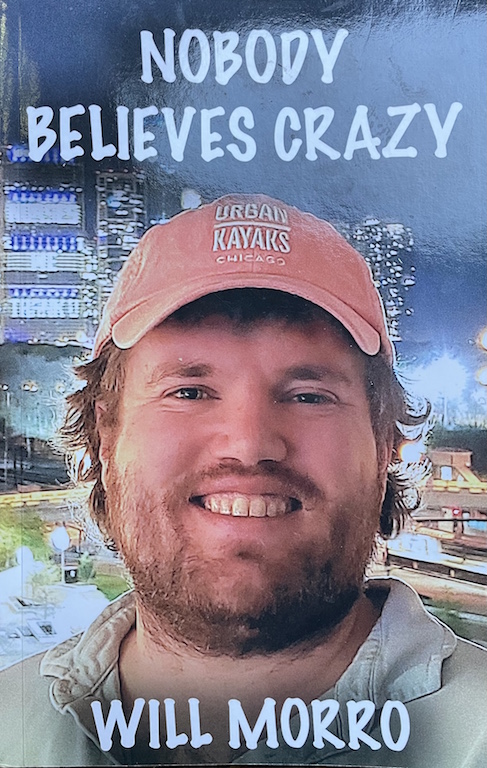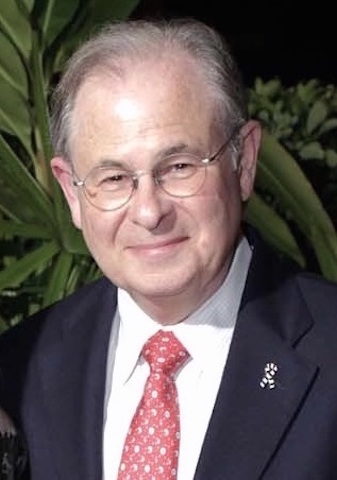
BY JUDY CARMACK BROSS
“Will Morro is a natural storyteller who puts you front and center in every scene. Nobody Believes Crazy makes you understand how challenging each and every day for someone with bipolar disorder is by melding with the reader’s mind and emotions,” shares Dusty Sang, publisher and co-founder of the Ryan Licht Sang Bipolar Foundation.

Morro’s debut book is his own story in his own words. At age 20, while attending Boston College, he received a diagnosis of bipolar disorder. Morro describes the subsequent challenges he and his family faced as terrifying but always insightful, including six hospitalizations in mental health facilities and nine psychiatric evaluations in emergency rooms.

Will Morro, at center, with James and Anna Morro.
The Chicagoan shares his generously shares his experiences with readers, describing the disease with clarity. He points to a particular passage in the book as its defining message: “There is method to the madness, I promise.” He expands, “People with bipolar disorder go through some intense and unexplainable highs and lows. They should be encouraged to share how they feel and reach those emotions. Our stories are incredible. We tend to see it all, admittedly aspects of reality that aren’t even there to be seen. Our perspectives are unique. We have a heightened sense of awareness of our surroundings and tend to get every situation we are part of because we spend countless hours analyzing and overanalyzing every encounter that develops in front of us.”
He continues, “They say that you shouldn’t judge a person until you walk a mile in their shoes. The perspective on life you might gain will not only surprise you but may even change how you view all things moving forward. Be careful, we have our own insecurities and our own set of fragilities. We spent a long time being cast out and even longer working our way back.”

Dusty Sang.
It was Sang, founder of the book publishing division of Stay Thirsty Media, Inc. (a news and entertainment company), who first discovered Morro’s skills as an author. Established in 2009, the same day that Kindle made its software available as an app for the iPhone, Stay Thirsty Publishing now has digital bookstores in the United States and twelve countries across the world. In 2016 the digital book publisher expanded into paperbacks and have, to date, put out 39 titles, 4 of which have become Amazon #1 Best Sellers in various categories and 3 #1 Amazon Hot New Releases.
“Stay Thirsty Publishing’s range includes fiction, nonfiction, and poetry. We recently published memoirs by award-winning veteran authors Jerome Charyn and Gerald Hausman, and our Stay Thirsty Poets – Vol. I (2019) included original poems by Jericho Brown, the 2020 Pulitzer Prize winner in poetry. Our publishing philosophy is based on the early Hollywood model of growing our own stars over time and reviving the spotlight for veteran writers looking to extend their brands,” Sang explains.
Nobody Believes Crazy is the company’s first title that deals with bipolar disorder: “After looking at manuscripts for more than a decade, writings by people with mood disorders, especially bipolar disorder, stand out. As we know from our work with The Ryan Licht Sang Bipolar Foundation, named in honor of our son Ryan who passed away at 24 in 2004 from bipolar disorder, people with this illness often see life in a very different way. It is as if their palate of colors has much greater variety, range, and intensity. Over time, I came to recognize that people with bipolar disorder put their words together in a different and often surprising way that reflects their special insights.”
Sang adds, “We receive so many submissions from well-educated, aspiring authors that never make it into print because they do not have that special something that draws the reader in and makes turning the next page an imperative. Of course, not all great authors have mood disorders, but there is something unique about the writings of those that do.”
For anyone who wants to truly understand what it is like to have bipolar disorder—what it feels like, how your brain reacts, and the feeling of being, at times, kidnapped by this illness—Sang says that Morro’s book is an important read: “I have known Will for more than a decade, and I was very familiar with his personal story. He contacted me one day that he was interested in writing a book about his life. I suggested that he submit two chapters, and I would personally look them over. Often people approach Stay Thirsty Publishing with similar enthusiasm, but nothing ever comes of it.”
Shortly after this conversation, Morro sent over his first chapters. They were strong. Sang encouraged the budding author to complete his memoir, providing tips on how to structure it. “To my surprise, a couple of months later Will submitted the completed manuscript, and I personally read it,” Sang says. “Not only was I drawn to the authenticity and frankness of his account but also to the way his observations unfolded. There are parts of the book that are just magnetic, and sometimes terrifying, as you live the real estate inside his brain. It is an account of having bipolar disorder that was clearly deserving of publication. Further, to preserve the rawness of his story, we did very little editing. It was not a surprise when the book rocketed to the #9 rank of Amazon Best Sellers in the Bipolar Disorder category,” Sang recalls.
Morro’s direct and clear writing style draws the reader into this short and powerful memoir: “I learned from Dusty not to waste the reader’s time taking up space. An author owes it to the reader to make their reading time well spent. Each paragraph should lead into the next one and so on, and what needs to be said is said. Writing can be a hard and grueling task. And, of course, write what you know about. I wrote about what I had figured out about myself.”
When it comes to handling the pandemic, Morro believes that a person with bipolar disorder is actually better prepared for the experience: “I think we understand ourselves,” he says. “Perhaps there is not as much depression. Some people, who are not bipolar, have started questioning their relationships, their friendships, and the like during this period when we are so distanced. I just put on my music and relax. I have been self-reflective for a long time.”
As COVID-19 vaccinations have started to be deployed across the country, the Ryan Licht Sang Foundation prepares for its next art exhibition, INSIGHTS IV, at the Zolla/Lieberman gallery this October. Its Early-Onset Bipolar Medical Briefing Luncheon, featuring Margaret Trudeau, is scheduled for May 2022. Morro’s mother, Amy, spoke at the 2015 Briefing Luncheon, sharing what she called a scary and exhausting time at the beginning when she first visited her son in a psych ward “which did not look any different from the one in One Flew Over the Cuckoo’s Nest with triple sets of locking doors.”

Helena Janica, Amy Morro, and Will Morro at INSIGHTS II.
To real estate executive Amy Morro, her son’s manic periods often involve lack of sleep “probably akin to that feeling you have when you wake up at 3 a.m. and there are so many worries circulating in your head.” She explains, “Our family’s story is not unique. It is the story of love and devotion. I am the mother of three wonderful children, one with bipolar disorder. I am filled with a realistic hope that, through research, tomorrow will be better. The more we can learn about the brain, the more we understand why people are held hostage by illness of the brain, the more we will be able to help others lead a more normal and productive life.”
And this is exactly the work that the Ryan Licht Sang Foundation, which is unrelated to the privately-held Stay Thirsty Media, is tirelessly engaged with. Sang describes how the organization, which he began with his wife, Joyce, came to be: “Ryan was our only child. He had early-onset bipolar disorder that, as we look back, began to present when he was about five years old. Over the next 19 years, he battled the demons of this insidious illness of the brain at a time when the medical science in this field was primitive at best. He was one of those very high-functioning, highly creative people with talents in music, art, and writing. He left behind a body of work of an artist twice his age.”
Sang shares that when Ryan passed away, he was at the height of his life: he had just become engaged to a wonderful girl, was finishing his first novel, had scored the music for an independent movie, and had created a collection of “outsider” artwork. He had been feeling healthy and happy. Unbeknownst to everyone, he had stopped taking his prescription mood stabilization medication and when he entered a sudden manic phase, he was “like a computer without a surge protector.” He had not slept in days and in order to go to sleep, he self-medicated. Tragically, he passed away in his sleep.
“On the day of his funeral, Joyce turned to me and said that we had to create a foundation in Ryan’s honor so that other children would not have to go through what he had and other parents would not have to be us,” he remembers. “The Ryan Licht Sang Bipolar Foundation was formed in October 2004 and is now approaching its 17th year, with a mission to foster awareness, understanding, and research for early-onset bipolar disorder. The Foundation is on a Quest for the Test to find an empirical, biomarker test for bipolar disorder so that early diagnosis and early intervention become a reality.”
Sang says, “I believe Nobody Believes Crazy is a must read not only for people with bipolar disorder but also for their parents, siblings, spouses, and friends in order to better understand what it is really like to be held hostage by this illness of the brain.”
To purchase Will Morro’s Nobody Believes Crazy, click here.






